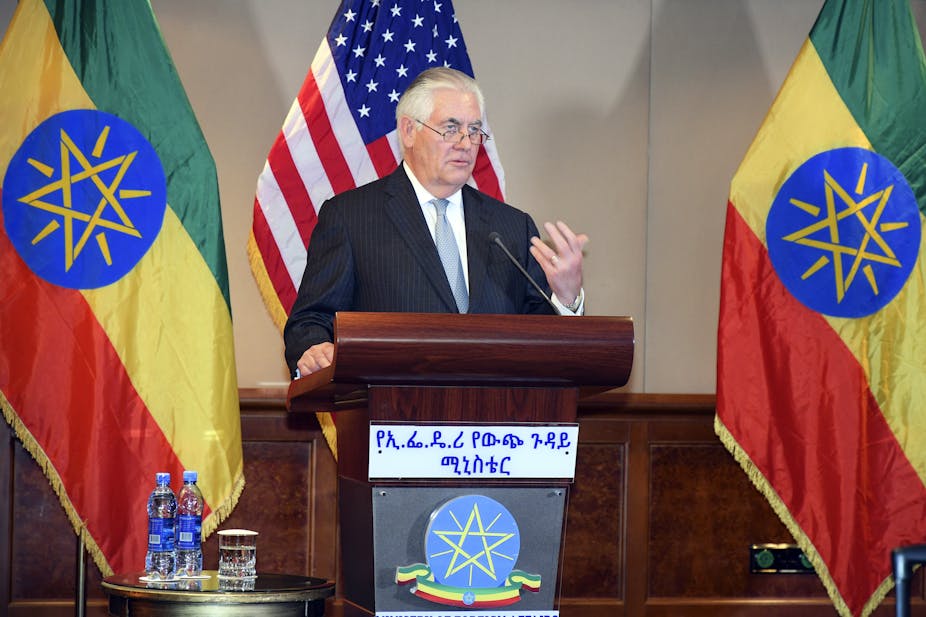US President Donald Trump sent his Secretary of State Rex Tillerson to Africa in an attempt to mend relations after the president’s unprecedented insult of an entire continent, referring to African states as “shithole countries”. The trip took place after more than a year of neglect from the White House and State Department.
The five countries chosen for Tillerson’s visit confirms the perception that Washington’s first and foremost interest in Africa is security. So far the secretary of state has had nothing to offer to his African partners. This may well be because the Trump administration still doesn’t have a policy towards Africa. An assistant secretary of state for Africa hasn’t been appointed yet, nor have ambassadors to a number of African countries, including South Africa.
The lack of an Africa policy may explain the public outcry that followed the killing of four US special forces in northern Niger in October last year. The biggest problem for the public and for the politicians on Capitol Hill was quite simple: what were US soldiers doing in Niger? For that matter what are American special forces doing in Africa? How is it at all possible that the US has deployed more than 6,000 troops on the continent when the official policy still is ‘no boots on the ground’?
The White House never delivered an official answer to these obvious questions. But Tillerson’s itinerary in East and West Africa provides some clues. The trip had everything to do with security. And little else.
The stopovers
In Ethiopia, his first stop, Tillerson took the opportunity to criticise China’s large and growing economic engagement all over Africa. China “promotes dependency” and it “undermines the sovereignty of Africa”, Tillerson said.
But apart from criticism, Tillerson didn’t have much to offer by way of economics and investments. By contrast, evidence of China’s engagement in the country can be seen at every turn. The meeting took place at the AU’s new headquarters which was financed by China. Beijing has also built and paid for the metro running from the airport to the centre of the city. The Chinese also paid for and built the railway line connecting Addis Ababa with the port in Djibouti on the Gulf of Aden.
While in Addis Ababa, the US secretary of state also met with representatives of the African Union. The meeting was important because African soldiers conduct peacekeeping missions in a large number of countries on the continent. Before he left Washington Tillerson stated that last year, the US supported more than 27 000 African peacekeeping troops deployed in more than 20 countries.
The second stop on Tillerson’s African roundtrip was the small Horn of Africa state of Djibouti where the Americans have had a permanent base – ‘Camp Lemonnier’ – since 2001. Situated close to Somalia, Yemen and the Indian Ocean, the base has been a crucial fulcrum for the US global war on terror. The camp has been the home base for some 2 000 servicemen and Washington has just signed a new lease agreement for another 30 years.
Last year China opened its own naval base only a few miles from ‘Camp Lemonnier’.
It was no coincidence that the third stop was Kenya. Even though the US did not back Kenya’s invasion of Somalia in 2011, the Pentagon has supplied the Kenyan Defence Forces with advanced weapons and trained Kenyan soldiers who crossed into Somalia in their hunt for Al-Shaabab fighters and supporters.
The US Secretary of State had no problems with the Kenyan authorities when issues related to the fight against Al-Shabaab were on the table. But Tillerson couldn’t avoid commenting on the big challenges facing Kenya’s democracy in the wake of last year’s election. Nevertheless the US also knows that it can’t apply too much pressure on the Kenyan government. Doing so would risk Kenya threatening to pull its troops from the peacekeeping mission in Somalia.
Tillerson’s fourth stop was Chad, emphasising that his round trip was most of all about strengthening military friendships and security alliances. Chad is a key state for the American anti-terror struggle in West Africa.
Tillerson’s biggest challenge during his visit in N’Djamena was explaining why a close US ally was on Trump’s travel ban list.
Nigeria was the last stop. Once again, the close cooperation on security explains the visit. During several years, Washington has supported the Nigerian army in its attempt to defeat Boko Haram.
Only one conclusion
The lesson to be learned from Tillerson’s first trip to Africa as Secretary of State is simple: Africa is important to US security because it is a crucial component in the global war on terror and Islamist radicalisation. The continent is also perceived as a battleground in the global competition between Beijing and Washington.
While China is ready to invest huge sums of money in Africa, the US is not up to doing the same.

